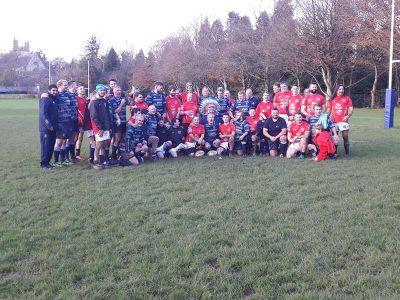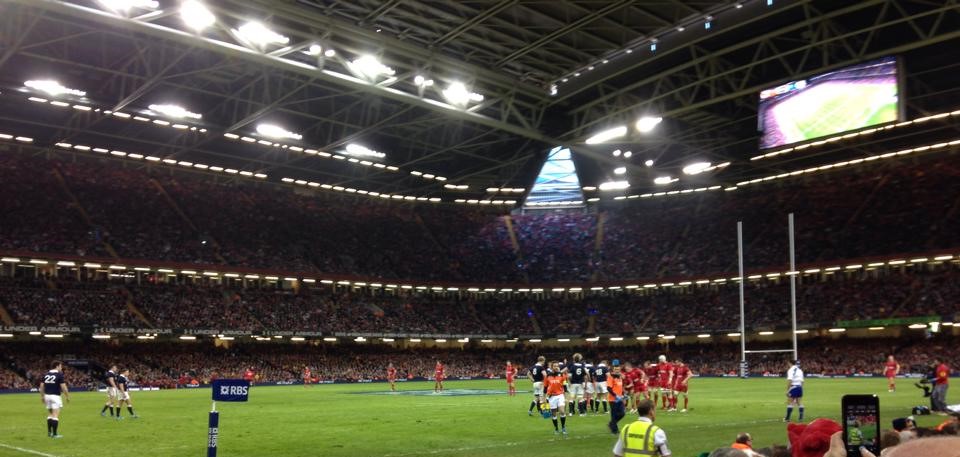[youtube width=”200″ height=”150″]http://www.youtube.com/watch?v=gJ4OnDnP66w[/youtube]
What went wrong?
With only six weeks before Wales’ first game of the 2013 Six Nations against Ireland, the team must evaluate why the autumn was so abysmal.
Bryn Parker, Keith Jones and Jill Parker, from clubs around Wales, raise similar issues.
1) Their coach, Warren Gatland, was missed due to commitments to the British Lions.
2) Injuries before and during the series including Adam Jones, Huw Bennett, Richard Hibbard, Alun Wyn Jones, Bradley Davies, Luke Charteris, Dan Lydiate and Jamie Roberts plus others.
3) Rhys Priestland’s collapse in form – who will replace him after his injury last week?
4) James Hook and Gethin Jenkins, both French club players, were left out.
5) Simple ball handling errors meant big runners – George North, Alex Cuthbert and Leigh Halfpenny – had no impact.

Wales looked much more determined against the Wallabies but fell victim to a heartbreaking conclusion
Bryn ends, “We are a small nation with financial limitations that needs all our personnel to be available and play at the top of our game.” If not, Wales will always struggle.

The Cardiff Blues' home ground, Cardiff Arms Park, has a capacity of 12,000 compared to the 75,00 strong Millennium Stadium next door
Fears are growing that if problems in regional Welsh Rugby Union are not resolved, the national side’s recent poor performances will become a regular sight.
Confidence was high in the Wales dressing room at the start of the Autumn Internationals. Wales achieved a top four finish at the World Cup and another Six Nations Grand Slam. Captain Sam Warburton confidently expected to defeat Argentina, Samoa, New Zealand and Australia at the Millennium Stadium.
Now Wales are coping with a humiliating whitewash and seven-match losing streak.
The tenth anniversary of replacing the club-based system with regions approaches but problems with Cardiff Blues, Ospreys, Scarlets and Newport Gwent Dragons are reaching crisis point.
Is this threatening national performances? The Welsh Rugby Union (WRU) is so concerned a Professional Regional Game Board has been created to oversee and judge regional impact.

The Welsh Rugby Union is responsible for the running all aspect of rugby in Wales: including almost 300 clubs, the regions and the national side
BBC commentator Eddie Butler says, “Until now, the Wales squad have managed to divorce regional from international form, but there’s no denying the creeping advance of routines and habits from below.”
Au revoir
Arguably the predominant problem is the loss of players to big-money clubs, particularly in France. Dan Lydiate is the latest to join the exodus and Toby Faletau may be next.
The French exodus:
- Jamie Roberts
- Mike Phillips
- Gethin Jenkins
- Lee Byrne
- James Hook
- Luke Charteris
- Aled Brew
- Huw Bennett
- Jamie Robinson
- Eifion Lewis-Roberts
Players are being forced to prioritise between their pay-cheque and playing in Wales.
The regions’ £3.5m salary cap and rejection of central contracts, used with great success in Ireland, frustrate players and fans alike. Leinster has won the last two Heineken Cups; making up five Irish wins since 2005.
Jill Parker, Secretary of Cardiff RFC, says the regions, “cannot spend their entire budget on international players who are unavailable for weeks during the season.”
Rhyl RFC’s Secretary Keith Jones says players are not to blame for moving to bigger clubs but some are snubbed because they are based in France or England.
Decisiveness is necessary says Eddie, “It’s becoming clear the Welsh domestic game is losing touch with the European club scene.
“If nothing is done, the steady decline of the regions and Wales will accelerate.”
Out of position
Players flee Wales due to lack of money and coherent hierarchy.

The record turnover was attributed to three of the 2012 Six Nations games being hosted at the Millennium Stadium, all with huge crowds
In a year when the WRU announced a record turnover of £63m, not enough filters down, says Jill, “More money is needed. The clubs are supposed to bring on young talent to feed into the regions.”
Clubs do not know their hierarchical place. With all regions based in southern Wales and only one northern regional centre in Colwyn Bay, Bryn Parker, Secretary of Cwmbran RFC, states, “It can mean a ninety-minute journey both ways for some players.”
This has affected school and club training. According to Eddie, “Schools rugby appears a shadow of what it once was. The greatest investment needs to be made in development from the age of 16. The structure of schools, academies and clubs needs to be overhauled.” Otherwise all teams, from club to national, will suffer.
Nothing to cheer
National crowd support remains high but a report by Walesonline shows the regions’ average home attendances falling:
- Cardiff Blues – 7,775
- Newport Gwent Dragons – 5,936
- Ospreys – 7,863
- Scarlets – 10,335
Leinster’s average in comparison is 26,152.
Despite the Ospreys’ RaboDirect 12 title last year, ticket sales and finances are dropping. Keith blames the quality of the league, “The RaboDirect is no proper preparation for international rugby.”
The regions have disappointed in this season’s more prestigious, competitive Heineken Cup. The Ospreys have been the only winners, once, from nine games.
It is hoped Judgement Day – all four regions playing in two matches back-to-back – at Millennium Stadium in March will boost support.
Eddie Butler examines the regions:
Professional Regional Game Board
The WRU are combatting the threat to the national game. After Price Waterhouse Coopers accountants published a critical report on the regions, the PRGB was formed.
Four WRU members, four region representatives and an independent chairman – Sir Wyn Williams – will meet monthly to manage the game. There is hope already concerning their most pressing objective, the loss of players. Alex Cuthbert and Dan Biggar, who were linked to French clubs, are staying in Wales.
While the PRGB aims to develop the regions Bryn suggests that is overreaching. “We can only afford two good regions,” he claims.
Wales aims to end their losing streak in their Six Nations title defence but being ninth in the world rankings and drawn in 2015 World Cup’s “group of death” long term solutions are crucial.
Regional improvements will establish stronger foundations for the building and maintaining of national success. It is yet to be seen if the PRGB will provide these improvements.
[youtube width=”200″ height=”150″]http://www.youtube.com/watch?v=gJ4OnDnP66w[/youtube]
What went wrong?
With only six weeks before Wales’ first game of the 2013 Six Nations against Ireland, the team must evaluate why the autumn was so abysmal.
Bryn Parker, Keith Jones and Jill Parker, from clubs around Wales, raise similar issues.
1) Their coach, Warren Gatland, was missed due to commitments to the British Lions.
2) Injuries before and during the series including Adam Jones, Huw Bennett, Richard Hibbard, Alun Wyn Jones, Bradley Davies, Luke Charteris, Dan Lydiate and Jamie Roberts plus others.
3) Rhys Priestland’s collapse in form – who will replace him after his injury last week?
4) James Hook and Gethin Jenkins, both French club players, were left out.
5) Simple ball handling errors meant big runners – George North, Alex Cuthbert and Leigh Halfpenny – had no impact.

Wales looked much more determined against the Wallabies but fell victim to a heartbreaking conclusion
Bryn ends, “We are a small nation with financial limitations that needs all our personnel to be available and play at the top of our game.” If not, Wales will always struggle.





